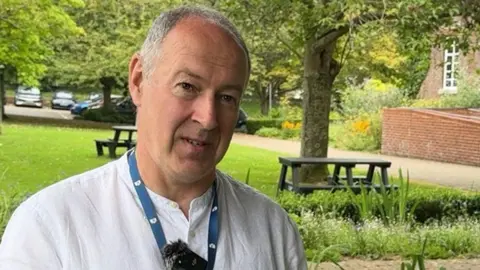Wessex mayor would be 'Jude the Obscure', MP says
A proposed "mega-mayor" for three English counties would be a little-known figure with no connection to most of the area, an MP has said.
The government announced plans on Monday for every English region to have an elected mayor to oversee housing, planning, education and other services.
The leaders of Dorset, Somerset and Wiltshire councils welcomed the move, having previously announced plans for a Heart of Wessex authority.
However, Mid-Dorset and North Poole MP Vikki Slade told the House of Commons a Wessex mayor would be like the Thomas Hardy character Jude the Obscure.

She said: "I have faced local government reorganisation before, as leader of Bournemouth, Christchurch and Poole (BCP) Council.
"Five years on in Dorset, the public are not convinced that large unitaries [single tier councils] work for them.
"They do not see services improve; they just see a more remote council that has to cover a much bigger area, moving money from where it was raised to be spent elsewhere, and through an organisation that cannot understand the differing needs.
"Scale that up even further, and I fear that more issues and individual community needs will slip through the net."
The Liberal Democrat spokesperson on local government said mayors would have "extended powers and the ability to levy a mayoral tax".
Ms Slade added: "For my area of Wessex, which is Thomas Hardy country, rather than being well-known local leaders, the creation of a mega-mayor is more likely to be a case of Jude the Obscure," a reference to the Hardy novel.
Later, in an interview with BBC Radio Solent, she acknowledged that mayors might have some beneficial powers over strategic planning and transport.
BCP Council has previously resisted an invitation to join the proposed Heart of Wessex region.
However, in a statement, it said: "We are still open to looking at all devolution options... including a regional mayoral system."
Dorset Council leader Nick Ireland said the formation of a larger mayoral authority was inevitable.
The Lib Dem councillor said: "The advantage is we will get money and the reality is we don't really have a choice. The government is mandating this.
"Realistically, I think we may have an election in May 2026 for a mayoral strategic authority."
Ministers see the creation of more powerful local mayors as a way of unblocking infrastructure and attracting greater investment.
Elected mayors would oversee areas representing two or more councils. Dozens of district councils could be abolished as a result.
However, Dorset would be unaffected in that respect because its two councils are unitary authorities and would remain in place as a lower tier of local government.
You can follow BBC Dorset on Facebook, X (Twitter), or Instagram.
